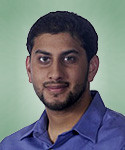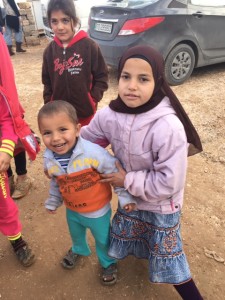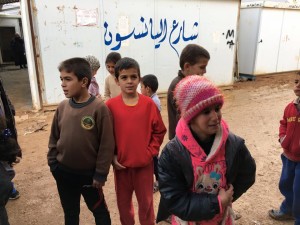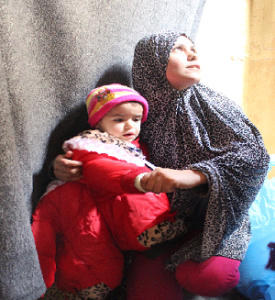February 3rd, 2016
Zaatari: Day 3 with Syrian Refugees
Ahmad Yousaf, MD

Ahmad Yousaf, MD, is the 2015-16 Ambulatory Chief Resident in Internal Medicine at Rutgers New Jersey Medical School.
This is my third post about my trip to the Zaatari Refugee camp in Jordan with the Syrian American Medical Society (SAMS). I will continue to share my daily journal entries with you in hopes of educating the American medical and nonmedical communities about what I saw, erasing the irrational fears that have guided the discussion of refugees in this country, and as a form of therapy for myself.
Reflections from Day #3 with Syrian refugees:
1) The Zaatari refugee camp is both a fascinating human achievement and, simultaneously, a mark of shame on the record of humankind. There are organized shipping container-like abodes set up in miniature communities, with tiny malnourished, barefoot children roaming the streets despite the freezing cold. The supply distribution system is impressive, but the condition of 80,000 innocent human beings stuck in a place far from the comforts of home is horrendous. There is a combination of hope and horror intertwined into the mundane life of waiting/surviving in this limbo — people seem to just stare off into space, daydreaming of a home that probably doesn’t exist.
2) The human spirit’s ability to simply survive is remarkable. A living hell exists in this world, and children with nothing to be happy about and EVERYTHING to cry about, push through and flash peace signs and smiles. We were unworthy of those smiles but they graced us with wide eyes, excitement, and imagination we truly didn’t deserve.
3) The human touch in western medicine is severely underrated. Putting your hands on people, giving a big bear-hug, holding a child to your chest, shaking the hands of an elder respectfully… It is all we have to offer sometimes…
Photography by Amal Rass and Joshua Margaritondo
One Syrian refugee described the refugee experience as a “slow death.” He contemplated whether or not going back to Syria was better because, at least if he died, it would be swifter than what he and his family were experiencing at the moment. He spoke of his people coming together again, in heaven. The following is a poem inspired by that conversation in combination with the news of the siege of the city of Madaya in Syria.
The Slow
His cold fingers tighten around our necks, clasped,
The last bit of air escapes and with it hope, collapsed,
The deep sleep is to follow but the screams keep us from the Light,
Dreams of feasts call us closer to slumber, but the pains of hunger keep us up this night,
Our mothers’ hands run over our bellies to fill them, a mercy,
Our fathers take up arms against the devils, to kill them, bravery.
But they are murdered by the victory of a false god, an evil wrought,
We only have prayer, the bitterness of salt and water sustains us not,
He now surrounds us, his barrels facing the barrels of our chests,
Our ribs now part, what is inside now visible through the skin and bones of our breasts,
We are but target practice, our hearts the bullseye,
Our names unknown, our value mistaken, too dry to cry,
We see him now, his darkness begins its plodding embrace,
Squeezes us gradually, tightly towards his face,
We meet his eyes and know the suffering is soon to be done,
We now welcome his coolness and the calm that lays beyond, the One.
We go limp in his arms, and up goes an army of lifted souls,
He carries us from Zaatari and Madaya to another heaven above, an incomplete people to be again made whole,
And so the screams are replaced with laughter. Tears of joy, not despair, now fill our eyes,
The Slow Death has delivered us and now we indulge in the everlasting supply of His Love in Paradise.
~Yousaf




I’ve seen the flame of hope among the hopeless
And that was truly the biggest heartbreak of all
That was the straw that broke me open
Read more: Bruce Cockburn – Last Night Of The World Lyrics | MetroLyrics
I live 45 munutes from the boarder
some injurded Syrian people are treated in Israel
like in all war ( can we talk of a war ?) the poor people are suffering and the men, who think they should be leaders ,give orders to kill and destroy!!
Happy for you ,working for refugiees
dr m gershoni pediatrician